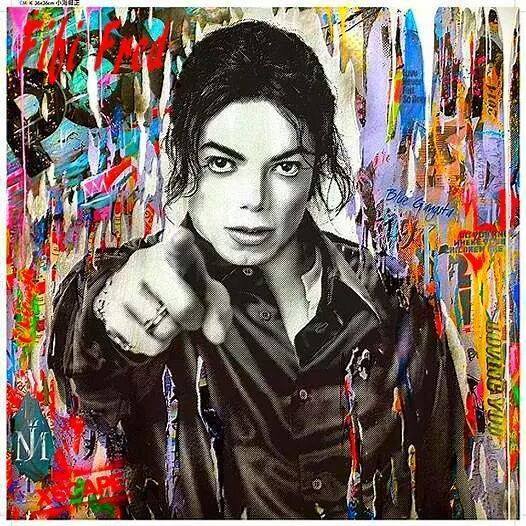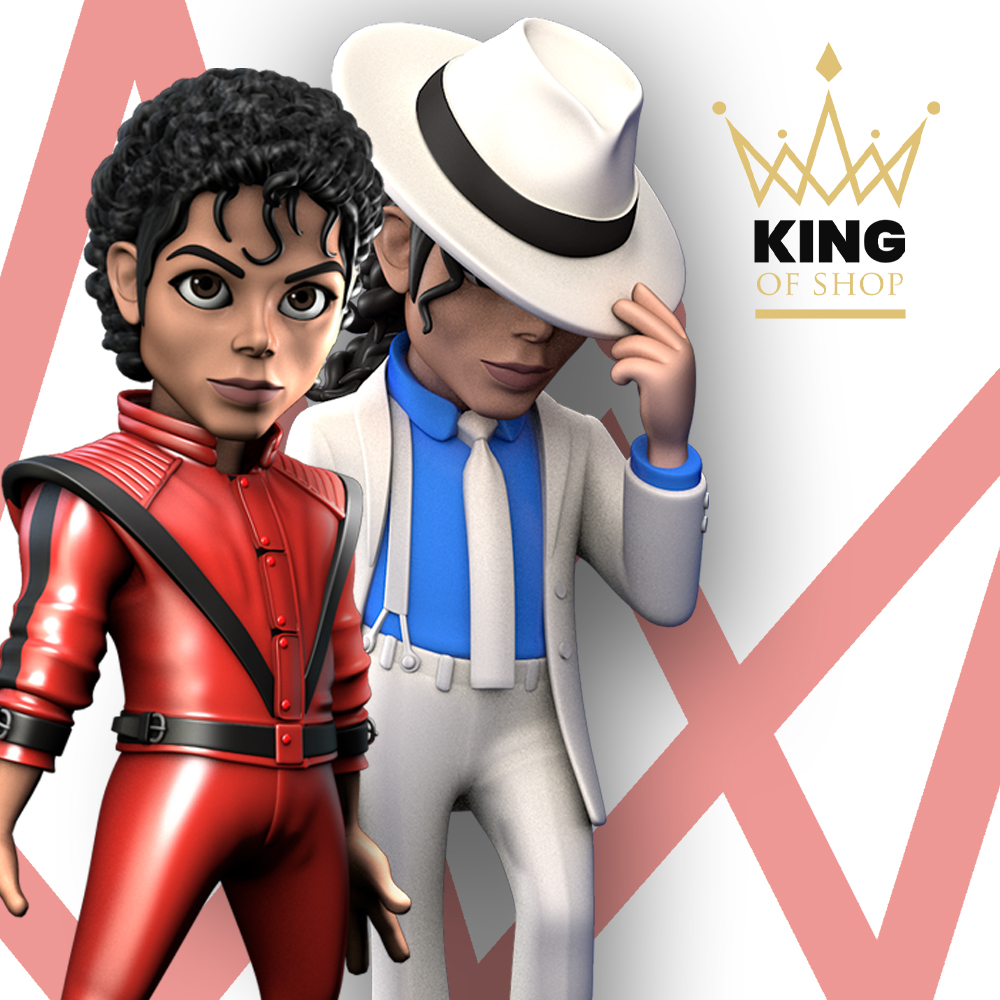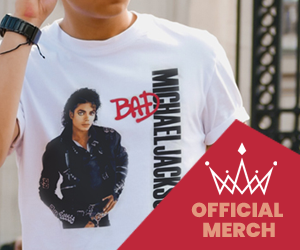LET’S MAKE A MICHAEL JACKSON ALBUM (Fall, 2013)
JOHN BRANCA (Co-Executor of the Michael Jackson Estate): L.A. Reid did not let us or the fans down. His passion was evident from the beginning.
L.A. REID (Co-Founder of LaFace Records; Currently the chairman and CEO of Epic Records): It started last year of September. No one asked me to oversee this project. It was the other way around. I asked to do it, because being at Epic Records we call this the House That Thriller Built. “Love Never Felt So Good” was the song that really launched the recording process. When I heard that it was just Paul Anka playing piano and Michael singing I smiled. It was as if the sun came out. That day became a beautiful day because that music was coming through my speakers and into my soul. From there I said, “Okay, if the world hasn’t heard this, then there’s an album to made.”
TIMBALAND (Grammy winning producer who oversaw most of the production on Xscape): I was very apprehensive about getting involved in this project. I did this album because of Michael Jackson. It completes my legacy. But my issue was I didn’t want to work with somebody that wasn’t here. Michael is someone I grew up on. The whole thing took me back to Aaliyah and Static [Major]. So I really had to deal with some things working on this Michael project.
L.A. REID: I didn’t want to go to anyone else to lead this project… only Timbaland. Timbaland is my number one favorite producer in the business. He’s like Muhammad Ali production-wise… he’s been the champion at least three times. My son Aaron set up the meeting and I went to Timbaland’s studio and he was working on his own album. There was a lot of people in the room so I just asked him to step out of the room for a second and I had a private chat with the man. I just said to him, “I want to do something really, really special. How does this sound? Michael Jackson produced by Timbaland.” He said, “I like how that sounds.”
TIMBALAND: [Xscape] brought out a lot of emotions. It took me a week to get through it. Every time I would play a song I would be like, “Put on something else…I can’t do this right now.” But once I started getting into it and was at ease with it and prayed about it, the music started to come to me. And I’m going to be honest with you, listening to those raw tracks of Michael made me cry. He’s not here to see this. So to hear him singing… man. I always tell people I don’t care who you are and what you aspire to be. You will never be Michael Jackson. Usher is Usher. And Justin [Timberlake] is Justin. Those two guys are amazing. But there’s no comparison to Michael Jackson. None.
L.A. REID: I went to the others after Timberland had done all that he could do and was sort of exhausted [laughs]. I went to Stargate and Rodney [Jerkins] because I love them as well. You have to go to people you trust, and I trust Stargate. And Rodney was the producer that had already worked with Michael.
RODNEY JERKINS (Grammy winning producer who worked on the bulk of Michael Jackson’s last studio work, 2000’s Invincible): Me and Michael first worked on “Xscape” in 1999. L.A. will tell you I was a jerk through the whole process [laughs]. I care. Michael was a dude that was a friend of mines. I had a good relationship with him. He knew my family and I knew his family. So I would tell L.A., “I’m not doing a song until I hear the rest of the album.” Even when he would say, “Well, we have to do this first,” I would say, “I don’t care. I got to hear the whole album before I finish a song.” I wanted to make sure that everything stood up to what Michael would have wanted. That was important to me.
TIMBALAND: L.A. and me involved Stargate because we always felt their production. And by them coming from another country, Michael always stayed in Europe. To me Stargate are the hottest producers across the water. There was one record I felt like it needed their touch. They did a great job and nailed it.
TOR ERIK (One half of the hit-making duo Stargate, who has produced a string of hits for heavyweight headliners including Ne-Yo, Rihanna, Beyonce, and Katy Perry): L.A. came down to the studio and said I want to talk to you about Michael. To be honest with you my first thought was, “Oh no, not another [posthumous] album.” Sometimes the material isn’t strong enough and that was my initial worries. We met Michael and wanted to work with Michael, and we are huge fans of his. But we didn’t want to do anything to tarnish his musical legacy by taking some songs that are just leftovers. So L.A. says, “Okay, I hear you. Let me just play you some music.” He played a couple of things, but the song that really impressed us was “Blue Gangster.” It was a six minute piece of music and Michael was singing his heart out and the production was really beautiful and really up to date. That song made me see the light where this can really be something. But some of the songs were already done so we asked L.A., “What do you have for us?”
L.A. REID: I’ve had so many hits with Stargate from Rihanna to Jennifer Lopez. They’re the kind of guys you go to when you are very clear about exactly what you want. I call Stargate pinch hitters. You go get those guys when you want them to swing, which inning, and which play. You call Stargate and you are going to get a hit.
TOR ERIK: We basically turned L.A. down after the meeting because some of the earlier tracks they wanted us to work on we didn’t find them interesting. So L.A. called us a couple of days later and said, “Whoa, whoa, whoa… I got one more.” He sent it to us and all we heard was the a cappella. And I was just floored. It was just a great moment of Michael Jackson vocals. From top to bottom some fantastic harmonies. That was the song that got us on board…”Place With No Name.”
L.A. REID: “A Place With No Name” was originally titled “A Horse With No Name,” which was a song by a band called America. And so Michael re-wrote the song and re-wrote the lyrics with America’s permission and titled it “A Place With No Name.” When I took it to Stargate the way they approached it was so creative. They listened to the time signature of the song, which was a 6/8 time signature. So the guys from Stargate asked, “Which songs have had the 6/8 time signature?” There were songs like Stevie Wonder’s “Higher Ground,” which was an influence. And “Higher Love” by Steve Winwood was also an influence when they approached it. It’s a really special record.
TOR ERIK: That time signature came about because of Michael’s vocals. I didn’t even want to hear the original demo. All I wanted to hear was Michael’s vocals. And when I listened to Michael he’s in the booth snapping his fingers, clapping his hands and stomping his feet. He’s doing all these energetic things that gave us a vibe where this track should go. That’s when we started to experiment with the bassline. We didn’t even have the drums on it yet, just the bassline and a chord progression that really worked for something more danceable. Then we started working on drums. But all of that stuff really came from Michael Jackson.

LET’S MAKE A MICHAEL JACKSON ALBUM (Fall, 2013)
JOHN BRANCA (Co-Executor of the Michael Jackson Estate): L.A. Reid did not let us or the fans down. His passion was evident from the beginning.
L.A. REID (Co-Founder of LaFace Records; Currently the chairman and CEO of Epic Records): It started last year of September. No one asked me to oversee this project. It was the other way around. I asked to do it, because being at Epic Records we call this the House That Thriller Built. “Love Never Felt So Good” was the song that really launched the recording process. When I heard that it was just Paul Anka playing piano and Michael singing I smiled. It was as if the sun came out. That day became a beautiful![]() day because that music was coming through my speakers and into my soul. From there I said, “Okay, if the world hasn’t heard this, then there’s an album to made.”
day because that music was coming through my speakers and into my soul. From there I said, “Okay, if the world hasn’t heard this, then there’s an album to made.”
TIMBALAND (Grammy winning producer who oversaw most of the production on Xscape): I was very apprehensive about getting involved in this project. I did this album![]() because of Michael Jackson. It completes my legacy. But my issue was I didn’t want to work with somebody that wasn’t here. Michael is someone I grew up on. The whole thing took me back to Aaliyah and Static [Major]. So I really had to deal with some things working on this Michael project.
because of Michael Jackson. It completes my legacy. But my issue was I didn’t want to work with somebody that wasn’t here. Michael is someone I grew up on. The whole thing took me back to Aaliyah and Static [Major]. So I really had to deal with some things working on this Michael project.
L.A. REID: I didn’t want to go to anyone else to lead this project… only Timbaland. Timbaland is my number one favorite producer in the business. He’s like Muhammad Ali production-wise… he’s been the champion at least three times. My son Aaron set up the meeting and I went to Timbaland’s studio and he was working on his own album. There was a lot of people in the room so I just asked him to step out of the room for a second and I had a private chat with the man. I just said to him, “I want to do something really, really special. How does this sound? Michael Jackson produced by Timbaland.” He said, “I like how that sounds.”
TIMBALAND: [Xscape] brought out a lot of emotions. It took me a week to get through it. Every time I would play a song I would be like, “Put on something else…I can’t do this right now.” But once I started getting into it and was at ease with it and prayed about it, the music![]() started to come to me. And I’m going to be honest with you, listening to those raw tracks of Michael made me cry. He’s not here to see this. So to hear him singing… man. I always tell people I don’t care who you are and what you aspire to be. You will never be Michael Jackson. Usher is Usher. And Justin [Timberlake] is Justin. Those two guys are amazing. But there’s no comparison to Michael Jackson. None.
started to come to me. And I’m going to be honest with you, listening to those raw tracks of Michael made me cry. He’s not here to see this. So to hear him singing… man. I always tell people I don’t care who you are and what you aspire to be. You will never be Michael Jackson. Usher is Usher. And Justin [Timberlake] is Justin. Those two guys are amazing. But there’s no comparison to Michael Jackson. None.
L.A. REID: I went to the others after Timberland had done all that he could do and was sort of exhausted [laughs]. I went to Stargate and Rodney [Jerkins] because I love them as well. You have to go to people you trust, and I trust Stargate. And Rodney was the producer that had already worked with Michael.
RODNEY JERKINS (Grammy winning producer who worked on the bulk of Michael Jackson’s last studio work, 2000’s Invincible): Me and Michael first worked on “Xscape” in 1999. L.A. will tell you I was a jerk through the whole process [laughs]. I care. Michael was a dude that was a friend of mines. I had a good relationship with him. He knew my family and I knew his family. So I would tell L.A., “I’m not doing a song until I hear the rest of the album.” Even when he would say, “Well, we have to do this first,” I would say, “I don’t care. I got to hear the whole album before I finish a song.” I wanted to make sure that everything stood up to what Michael would have wanted. That was important to me.
TIMBALAND: L.A. and me involved Stargate because we always felt their production. And by them coming from another country, Michael always stayed in Europe. To me Stargate are the hottest producers across the water. There was one record I felt like it needed their touch. They did a great job and nailed it.
TOR ERIK (One half of the hit-making duo Stargate, who has produced a string of hits for heavyweight headliners including Ne-Yo, Rihanna, Beyonce, and Katy Perry): L.A. came down to the studio and said I want to talk to you about Michael. To be honest with you my first thought was, “Oh no, not another [posthumous] album.” Sometimes the material isn’t strong enough and that was my initial worries. We met Michael and wanted to work with Michael, and we are huge fans of his. But we didn’t want to do anything to tarnish his musical legacy by taking some songs that are just leftovers. So L.A. says, “Okay, I hear you. Let me just play you some music.” He played a couple of things, but the song that really impressed us was “Blue Gangster.” It was a six minute piece of music and Michael was singing his heart out and the production was really beautiful and really up to date. That song made me see the light where this can really be something. But some of the songs were already done so we asked L.A., “What do you have for us?”
L.A. REID: I’ve had so many hits with Stargate from Rihanna to Jennifer Lopez. They’re the kind of guys you go to when you are very clear about exactly what you want. I call Stargate pinch hitters. You go get those guys when you want them to swing, which inning, and which play. You call Stargate and you are going to get a hit.
TOR ERIK: We basically turned L.A. down after the meeting because some of the earlier tracks they wanted us to work on we didn’t find them interesting. So L.A. called us a couple of days later and said, “Whoa, whoa, whoa… I got one more.” He sent it to us and all we heard was the a cappella![]() . And I was just floored. It was just a great moment of Michael Jackson vocals. From top to bottom some fantastic harmonies. That was the song that got us on board…”Place With No Name.”
. And I was just floored. It was just a great moment of Michael Jackson vocals. From top to bottom some fantastic harmonies. That was the song that got us on board…”Place With No Name.”
L.A. REID: “A Place With No Name” was originally titled “A Horse With No Name,” which was a song by a band called America. And so Michael re-wrote the song and re-wrote the lyrics with America’s permission and titled it “A Place With No Name.” When I took it to Stargate the way they approached it was so creative. They listened to the time signature of the song, which was a 6/8 time signature. So the guys from Stargate asked, “Which songs have had the 6/8 time signature?” There were songs like Stevie Wonder’s “Higher Ground,” which was an influence. And “Higher Love” by Steve Winwood was also an influence when they approached it. It’s a really special record.
TOR ERIK: That time signature came about because of Michael’s vocals. I didn’t even want to hear the original demo. All I wanted to hear was Michael’s vocals. And when I listened to Michael he’s in the booth snapping his fingers, clapping his hands and stomping his feet. He’s doing all these energetic things that gave us a vibe where this track should go. That’s when we started to experiment with the bassline. We didn’t even have the drums on it yet, just the bassline and a chord progression that really worked for something more danceable. Then we started working on drums. But all of that stuff really came from Michael Jackson.
JUSTIN AND THE KING OF POP (Winter, 2013)
TIMBALAND: Justin [Timberlake] proved himself on “Love Never Felt So Good.” It was important for him to fit into the song like a duet. He told me, “I don’t want to fit in like a feature.” So that took some time. Justin was like, “This guy is so good. It’s hard to blend in with Michael.”
L.A. REID: The funny thing about that song is although there are overdubs of Michael’s vocals, what we found was only a one track demo of Michael and Paul Anka. So se couldn’t separate the two, which meant you couldn’t turn Michael up or turn the piano down. You had to work with the track. And the tempo fluctuated, which meant that you couldn’t simply lock up a drum machine and play along. This required musicianship to really turn it into a record.
TIMBALAND: When I heard Justin’s vocals I just said, “Wow.” He’s going to be the coldest white boy to ever do it. After hearing Justin on “Love Never Felt So Good” I looked at him totally differently. He’s a bad man.
L.A. REID: Honestly it was Justin who wanted to be involved. Justin and Timbaland are obviously very close but every time I would run into Justin he would say, “Okay, when are we doing it?” This was more of something that Justin willed. Justin and Timbaland worked on it together, but it was Justin’s own idea. I love that he was the guy that chose to be the ambassador to the Xscape project. He certainly measured up as a superstar and as a talent.
TIMBALAND: A lot of the songs on Xscape were songs Michael was going to revamp. So it was up to us to touch them up. We had all the sounds and vocals, but the songs on this album are the ones that L.A. thought were the most exciting. “Chicago” was my music under Michael. I heard some people say, “Oh, Timbaland shouldn’t touch these Michael songs.” The hardcore fans didn’t like me being involved in this project, but once they heard the music they were like, “Wait a minute. How can you make him sound like he did it in 2014?” That’s the gift I got from God. And it takes certain projects like Xscape to show the world who you really are.”
L.A. REID: John Branca, who manages Michael’s estate, told me that there was a song called “Chicago” that was really popular with the fans and that I should pay particular attention to that one. I listened to it and really liked it a lot. I included it on the list and that was as far as it went. When Timbaland got it, he turned it into something that really caught my ear. But no matter who produces a song there has to be an actual song to start with. So the real credit goes to Cory Rooney who wrote that song.
CORY ROONEY (songwriter; former senior executive at Sony): I ran into Michael in L.A. on a Wednesday. This was in 2000. We were talking and he let us hear things that he was working on for Invincible. And Tommy Mottola was with us and he said, “It would be cool if you went home and wrote something for Mike.” I was like, “Shit, man. Of course I will!” At this time I was working on every major project at Sony from Mariah Carey and J. Lo to Marc Anthony, but never Michael Jackson. So I came right home and wrote a song and by Friday afternoon I let Tommy hear my demo. He sent it to Michael right away. And by that Monday I got a call from Michael himself! He’s like, “Cory, you know what? I know the song, I’ve lived with it over the weekend and I’m here in New York and I would love to cut it.” Forget about it! I was looking at that phone like, “Oh my goodness!” It was crazy.
TIMBALAND: Working on songs like “Chicago” make me wish that Michael was still here. He sings so good that you become so into Michael. You want to hear and watch him do these songs.
CORY ROONEY: I wrote a story about a guy who meets a women on his way to Chicago. Michael would ask me, “Why did you name it Chicago?” And I said, “I don’t know…it just sounds better.” [Laughs] Michael loved the fact that I had him singing in a lower register. He told me that most people wrote things for him in a higher pitch. He showed up at the studio and I produced Michael’s vocals. The crazy part is this is Michael Jackson, but he dealt with me like a regular artist. He was like, “Cory, what time do you want me in the studio? And I’m like, “Man, you are Michael Jackson…you tell me when to be there.” [Laughs]
TIMBALAND: “Loving You” just feels like it’s part of an era. Like “Love Never Felt So Good” has a feeling of Off The Wall, “Loving You” feels like it could have easily come from that era also. This is Michael in his delicate voice. Michael has many voices. One of them is what I call the angry voice and he has that happy voice — “Chicago” has both. I happen to be a fan of both. But the song “Loving You” happens to be my personal favorite on the album.
CORY ROONEY: Hearing Timbaland’s version of “Chicago” was like getting that gift for Christmas from your parents. I had no idea what it was going to sound like. He took it in another direction that I would have never thought of taking it.
DARKCHILD FINISHES THE JOB (Winter 2014-Spring 2014)
RODNEY JERKINS: A few years ago there was a Michael Jackson project that came out (the 2010 album Michael). And this is before L.A. Reid was even involved. They asked me if I would produce five songs, but I turned them down. I wasn’t feeling the songs and I also felt like Michael had just passed away and I wasn’t in that mode. Last year when L.A. told me he was going to do a project, I felt his passion to make a great album. To me it didn’t feel like, “Oh yeah, let’s just put something out because the fans will buy it.” L.A. knew one day he was going to work with Michael. He felt like he owed it to Michael to make sure he put together the best project. If L.A. wasn’t involved I don’t think I would have done it.
L.A. REID: The most important point was I only wanted people who Michael either worked with or expressed a strong desire to work with. I just couldn’t be hearsay.
RODNEY JERKINS: The thing about Michael is he will work on a song for years. Last year I pulled up the files for some of the music and I walked through the studio with the mentality of, “What would Michael want me to do to this now? And what would I be telling Michael what we need to do to this song?” So I put everything aside and just used my imagination of how Michael would react to it and say, “Oh, that’s funky; add that part right there.” I felt like at the end when it was complete Michael would have been pleased with it. When we originally did “Xscape” Mike felt it was some of his best new music. So I asked him, “Michael how come ‘Xscape’ is not going on Invincible?” And Michael was like, “Nah…I don’t want it on this project. I want it on the next project.” Michael really wanted this song to be released. He felt compelled to let the fans hear it. What does it do for a song that Michael really loved to just sit in the vault somewhere?
TIMBALAND: Rodney [Jerkins] had a song that I felt like should be a part of this album. Rodney worked with Michael so he should be the one to finish “Xscape.” He had that personal connection with Michael we needed.
RODNEY JERKINS: I think Timbaland did an incredible job. We were talking one day and Tim played me the song “Do You Know Where Your
Children Are.” And soon as the groove came on I told Tim, “Yo Mike would have went crazy for that!” I know Michael. He probably would have jumped on a table and started dancing. He would have loved the bassline and that groove. I think that Tim and J Roc (Timbaland’s production partner) did a fantastic job, man. I also really loved what Tim did with “Slave To The Rhythm” and I really like what he did with “Chicago.” That’s one of my favorites on the album. And Stargate did a great job as well with “A Place With No Name.”
TIMBALAND: I can’t take the credit for the entire project. When I
listen to this album I think, “I still can’t believe we did this.” My mindset was just to assist Michael. I didn’t let my beats over power him. I didn’t go Timbaland HAM on him. I just let Michael be Michael and gave him the coolness to let him be him.
TOR ERIK: I’ve heard the album and I can honestly say that its evident that this is a labor of love. L.A Reid doesn’t need to do this. He’s got a lot of other things on his plate. Timbaland doesn’t really need to do this. Neither does Rodney. And we don’t need to do this. But we all went into this because we felt a certain responsibility to protect Michael’s legacy. We were all so inspired by Michael through the years. We are not riding a wave of sympathy or grief. Enough time has passed that this is a real musical project. I hear people’s respect for
Michael’s work. But I also hear very inspired producers doing some of
their best work.
CORY ROONEY: To this day I tell everybody when they ask me who was the best artist I’ve ever worked with it’s always Michael Jackson. This guy was a gentleman and he had so much respect for me, my time and my talent. I said to my wife that I pray that Xscape is nominated for a
Grammy because that Grammy will be my sole most prized posession of my entire music existence. That would mean everything to me.
L.A. REID: If people think of this project as anything other than the most wonderful artist who had some material that was not completed they are off on the wrong path. Let me tell you something… it’s so not about money. It’s way too expensive first of all. And there’s so many moving parts and it’s such a heavy investment. Xscape was never honestly done with the intent of it being a financial success. It was done with the intention of defending Michael’s honor. It was about getting people to understand his greatness in music. I wanted people to recognize that Michael Jackson was the greatest entertainer that ever lived, right? So when Michael passed away there was so much chatter around the negative media attention that he had gotten. This project was not made to erase those things. It was made to remind people that Michael Jackson is the greatest.
SOURCE: VIBE




